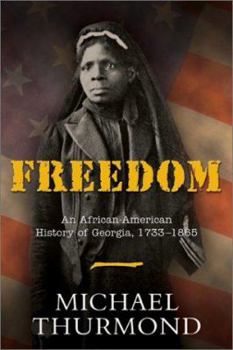Freedom: An African-American History of Georgia, 1733-1865
Decades before Georgia became the cradle of the modern Civil Rights Movement, generations of its African Americans waged a historic struggle to abolish the institution of slavery. Now Michael Thurmond... This description may be from another edition of this product.
Format:Hardcover
Language:English
ISBN:1563526875
ISBN13:9781563526879
Release Date:January 2003
Publisher:Longstreet Press
Length:304 Pages
Weight:1.55 lbs.
Dimensions:1.1" x 6.3" x 9.2"
Customer Reviews
1 rating
New Ground Plowed
Published by Thriftbooks.com User , 19 years ago
Thurmond's book (recipeint of the Georgia Historical Society's Lilla Hawes Award, and listed by the Georgia Center for the Book as one of "The 25 Books All Georgians Should Read") argues that Georgia was founded on high moral principle, although all practical arguments for a slave free Georgia, including its role as buffer for Carolina plantations, were used by its founder, Oglethorpe, to "sell" his idea. Against the assumption that only a slave economy could succeed in the South, Thurmond describes Darien and Ebenezer, successful settlements without slaves. Their residents, unlike those of Savannah (the clamorous malcontents), supported Oglethorpe in his resistance to the change in charter. "Oglethorpe took particular exception to an assertion by David Hume, the Scottish philosopher, that dark skinned people were genetically inferior to white Europeans and incapable of civilized behavior. `What a historian!' he exclaimed, `He must never have heard of Shishak, the great Sesostris, of Hannibal, or of Tirhaka, king of Ethiopia, whose very name frightened the mighty Assyrian monarch.' "Oglethorpe was certain that if Hume had studied the matter, he would have discovered `that Africa had produced a race of heroes.'", page 41. Oglethorpe predicted that if slaves were allowed in Georgia, that institution would one day destroy Georgia. He was right, and we've been rebuilding ever since 1865. "The knowledge of letters even in the lowest degree, is too often supposed to carry with it a sort of qualification for an easy life, and an exemption from a laborious one and the latter being the Negroes lot, they might perhaps bear it with more unwillingness, or seek some desperate means of ridding themselves of it." Henry Melchoir Muhlenger, a Georgia colonist, page 35. Thurmond goes on to recount the history of education of blacks in Georgia, the statutes on manumission (Slave owners who, in deference to the concept of jubilee in Biblical slavery, or to the fact that often the slaves in question were their own children and the mothers of their children, wished to free their slaves on their death beds were, ultimately, forbidden by state law from doing so, just as slaves were ultimately forbidden to buy their own freedom.), and the history of black soldiers in the Revolution, Spanish Florida, Seminole country, and the Civil War. "If you wish to know hell before your time, go to St. Simons and be hunted ten days by n*****s." A soldier in a Confederate landing party, page 197. Regarding the question of whether the War Between the States was fought to preserve the union, over states rights, or over slavery, Thurmond quotes a Confederate Colonel "...after slavery was dead, the Confederacy clung to its putrid body and expired with it" Colonel William Oates, page 253. Had white Southerners, in other words, allied with their black brothers, the Confederacy could have been preserved at the expense of slavery; but too many despised negroes more than they love




